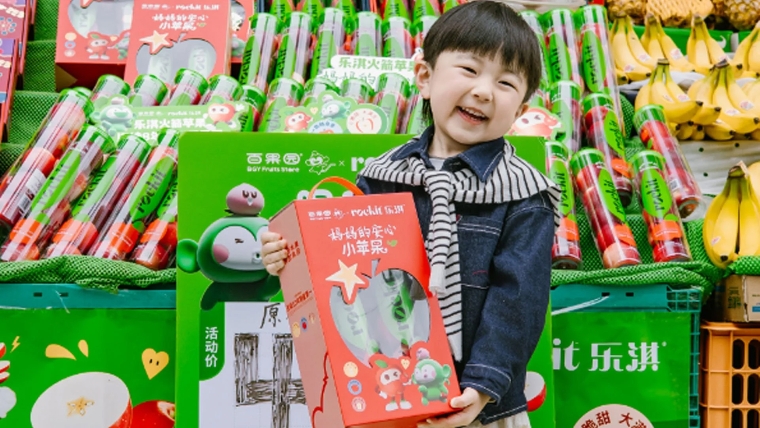
By Mark Tanner*
Long ago, the apple was only found growing wild in the mountainous forests of Central Asia, including what is now northwestern China. Cultivation began around 6,000 BC, which saw apples spread through ancient trade routes like the Silk Road and embraced by civilizations from the Egyptians to the Romans.
Yet despite millennia of trade and the incorporation into religions and everyday culture, the common apple – like many agricultural products – largely remained a undifferentiated commodity. Priced per kilo, traded in bulk, and consumed generically, apples have long been stuck in a cycle of commodity pricing and minimal branding. That is, until now.
Rockit™ Apple: New Zealand’s Bite-Sized Pioneer
Interestingly, it is a tiny-sized version of the crunchy treat that broke the commodity-curse, and has been rewarded handsomely for it. Miniature Rockit™ apples command a premium of three times its most expensive competitor in China, and sell for five times the average apple per kilogram.
Unlike conventional apples sold by weight, Rockit is sold by occasion. It comes in convenient tubes and multipacks, ready for school bags, office drawers, or premium gifting. It’s snack-sized, sweet, crisp, and wrapped in a story of innovation and fun.
“We don’t sell apples,” says Rockit Global CEO Grant McBeath, “we sell healthy snacks.” That reframe has allowed Rockit to move beyond commodity pricing and target moments: snacking, gifting, impulse buys. In China, where gifting fruit is a cultural norm, Rockit has positioned itself as the “bottle of wine” of fresh produce – something that is both premium and personal.
This occasion-based model has reshaped consumption patterns. Over 42% of Rockit apples are eaten outside the home, compared to just 14% for standard apples.
Localisation with Global DNA
Rockit’s China success has been the result of staying true to its global principles, but being relevant for China. The brand has invested heavily in local teams, insights, and execution. From Focus Media elevator ads targeting mums, to livestreaming on Douyin and Xiaohongshu, to licensed IP and its own mascot, Rocki, branded gifting tubes. The brand meets Chinese consumers where they are, while staying true to its core proposition of quality and fun.
Crucially, Rockit didn’t rely on distributors to “figure out China.” Instead, it built an on-the-ground team that will exceed 25 people next year, with a GM reporting directly into global leadership. As McBeath puts it, “You’re either all in on China, or you’re not.”
This boots-on-the-ground approach, combined with early support from Primary Collaboration NZ and NZ Trade & Enterprise, helped Rockit avoid common pitfalls and accelerate growth.
China’s Fresh Produce Goes Premium
Rockit™ Apple, like its hairy cousin Zespri – another fine fruit that can trace its roots back to China before being perfected and branded in New Zealand – are blazing a trail which a new generation of agri-brands are striving to follow. Together, they are transforming the way Chinese consumers view produce: from a functional food to slice and share at the dinner table, to a lifestyle marker, premium snack or even a social statement.
As Chinese incomes rise and consumer expectations evolve, so too does the meaning of a piece of fruit. Fruit packaging is being reimagined from rustic crates and plastic nets to elegant boxes and interactive unboxing experiences – not always to the benefit of the environment. Some, like local brand Wendan, incorporate regional heritage and seasonal cycles into box design. Others, like Choumei Akan, tie their produce to sustainability narratives and local culture.
China’s produce evolution is stretching well beyond packaging. Leading agri-brands are investing in standardised production, precision agriculture, and product innovation to support premium positioning. October Paddy Fields applies 118 quality control steps to its rice production. Chu Orange uses infrared tech to sort fruit based on sweetness without damaging it, providing a compelling quality story to tell.
Reimaging Produce Marketing
Whether it’s a premium snack brand from Hawke’s Bay, New Zealand or a rural orchard in Yunnan, branding is becoming increasing important to selling produce in China. As Rockit’s growth of over 50% suggests, Chinese consumers don’t just buy on price. They buy on trust, quality, health, occasion and narrative. They seek emotional and symbolic value alongside function.
Many foreign brands looking to replicate Rockit’s success, will need a mindset shift to treat their produce like a brand, not a commodity.
*Mark Tanner is the CEO of China Skinny, a marketing consultancy in Shanghai. This article was first published here, and is re-posted with permission.

We welcome your comments below. If you are not already registered, please register to comment
Remember we welcome robust, respectful and insightful debate. We don't welcome abusive or defamatory comments and will de-register those repeatedly making such comments. Our current comment policy is here.